► CAR’s pick of the best self-charging hybrid cars
► You’ll never have to plug them in
► A good compromise?
Whether a self-charging hybrid car is one of the best hybrid cars for you probably depends on the kind of driving you do. As the cleverly tweaked marketing term for a conventional or full hybrid suggests, self-charging hybrids never need to be plugged into the mains. On this page you’ll find CAR’s pick of the the best self-charging hybrid cars on sale in 2024.
The best self-charging hybrid cars are more affordable than plug-in hybrids, but they also have much smaller batteries and no extended electric-only driving range. If you’ve got the facilities to plug-in a PHEV and typically drive distances that are shorter than the car’s electric range, then seriously consider one of those. But the smaller batteries fitted to self-charging cars not only lower the purchase cost they also reduce weight, improving everything else from the handling to the packaging.
The best self-charging hybrid cars at a glance:
And as the latest models switch over to electric power at every opportunity, they run their internal combustion engines a remarkably small percentage of the time. Put all this together, and self-charging hybrids can deliver impressive real-world efficiency over a range of different driving scenarios. They’re also much more efficient than mild-hybrid cars, which offer little more than fancy stop-start technology and are mostly unable to run on electric-power alone at all.
The best self-charging hybrids
Honda Civic
Outstanding in almost every area
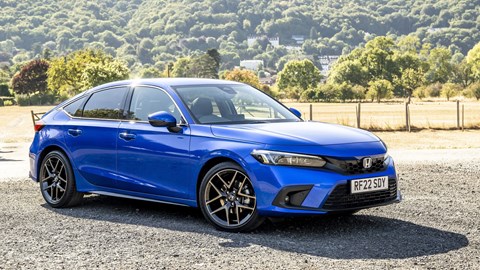
Pros: e:HEV hybrid system works like a range extender, delivers great performance
Cons: Almost no one will believe you about how good it is
While the latest Honda Civic may not look big news from the outside, its clever e:HEV hybrid system uses a bespoke 2.0-litre petrol that spends most of its time simply fuelling the electric motor. Making it refined and efficient yet capable of delivering a convincing 181bhp when required.
Add to that a delightfully well-crafted cabin and sophisticated ride quality with decent handling, which speaks of hundreds of honing test miles, and for us it’s the total package. Price: from £34,995
To find out more read our full Honda Civic review
Toyota Corolla
Five generations of self-charging refinement at work – and it shows
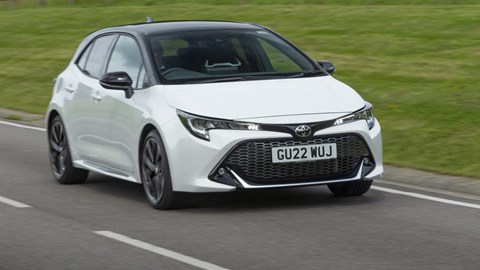
Pros: Seriously optimised hybrid system now more natural to drive, great real-world mpg, strong value
Cons: Never manages to trouble the concept of fun
The Toyota Corolla now sports a fifth-generation hybrid system – which is intended to be better to drive and more efficient. Target met as far as we’re concerned. It’s more responsive under your right foot but also so eager to opt for electric propulsion it’ll have the engine switched off something like 70 per cent of the time in urban driving.
This is great news for fuel economy, while other tweaks make the entire driving experience feel more natural. A thoroughly well-engineered and inexpensive-to-run car built right here in the UK. Price: from £30,495.
To find out more read our Toyota Corolla review
Lexus NX 350h
Best self-charging all-rounder from Lexus
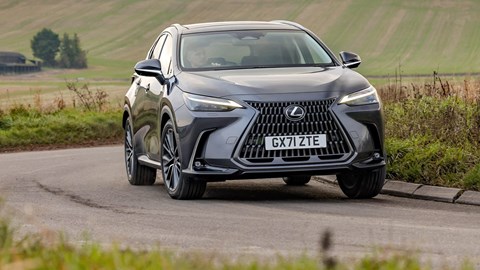
Pros: Lexus’s unique brand of luxury, comfortable, beautifully made
Cons: Still some confusing controls inside
Toyota’s premium brand makes a lot of hybrids, but the Lexus NX mid-size SUV is the one we’d pick. It’s just a really well-rounded package – nice enough to drive, compact enough to not be a pain around town, spacious enough for adults, and comfortable enough for lengthy journeys.
It’ll top 40mpg without too much effort, and the heavily revised infotainment system no longer makes you want to murder. Which is a bonus. Price: from £44,430.
To find out more read our Lexus NX review
Toyota Yaris Cross
Best self-charging compact SUV
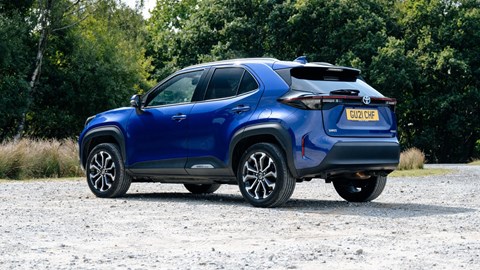
Pros: Spacious for its size, 50mpg+ easily, surprisingly tidy to drive
Cons: Sad interior, lame image
Rather than pretending to be a dinky SUV, as per others in the small car plastic-cladding brigade, the Toyota Yaris Cross actually is one – meaning its relationship to the regular Yaris is more like that of the Ford Puma to the Ford Fiesta than the Fiesta Titanium to the Fiesta Active.
You still probably won’t buy one for thrills, but the size-to-interior-space ratio is very positive and the hybrid powertrain can top 50mpg in the real world without any effort from the driver. Price: from £24,855
To find out more read our Toyota Yaris Cross review
Honda Jazz
Best for blending in at the bowls club
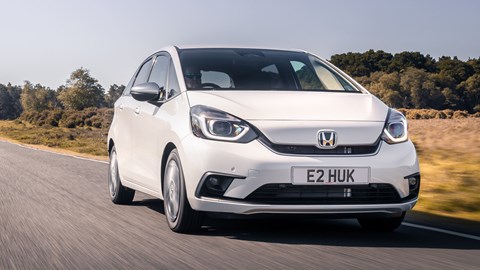
Pros: Magic Seats, magic e:HEV system, great mpg
Cons: People will ask if it came with a free bus pass
If you need a small car with a lot of space inside, the Honda Jazz is a great place to start. Clever Magic Seats and a 1.5-litre e:HEV hybrid engine give you practicality and efficiency in a very compact package, and we promise you’ll be pleasantly surprised about how perky it is to drive.
Need a little more personality? Then there’s always the Jazz Crosstar that pretends to be a dinky SUV. The Yaris Cross stole that version’s lunch money, though. Prices for the regular version start from £26,395.
To find out more read our full Honda Jazz review
Hyundai Tucson Hybrid
Best for occupying the middle ground
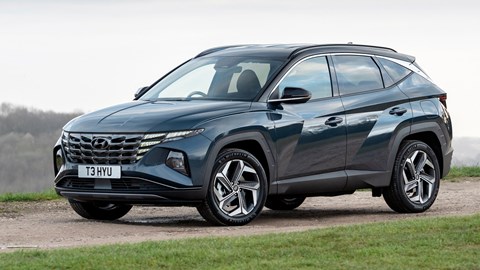
Pros: Plenty of power, plenty of mpg, plenty of lights
Cons: Plenty of yawns behind the wheel
You can get a Hyundai Tucson with any flavour of hybrid system you prefer, as the firm offers not only this self-charging model but also mild hybrid and plug-in hybrid technology as well.
All come with those eye-catching looks, some clever tech and a handy five-year unlimited mileage warranty, but the self-charger occupies some excellent middle ground thanks to its punchy 227bhp. Price: from £35,940.
To find out more read our full Hyundai Tucson review
Renault Austral
Proof that Renault’s ultra-complex hybrid system actually works
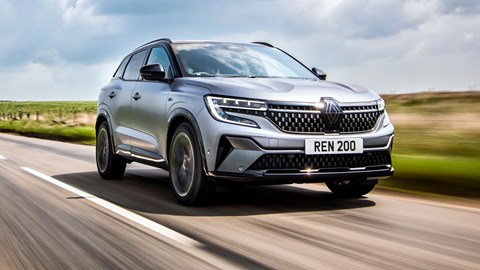
Pros: Useful 196bhp, potential 60.1mpg, F1 tech
Cons: Big wheels = bumpy ride
Anyone who’s experienced a Renault Arkana hybrid might be shocked to see its big brother make it onto this list, but in the Renault Austral, the French firm’s full hybrid system has finally come of age.
While it’s still a terrifically complicated arrangement, changing the wheezy old 1.6 for a modern 1.2-litre turbo has made a world of difference, delivering impressive power (196bhp) and 60+mpg. Price: from £34,695.
To find out more read our full Renault Austral review
Self-charging hybrids to avoid
Subaru is yet to show us a self-charging hybrid we could love. And the Suzuki Vitara hybrid isn’t a barrel of laughs, either – which is a shame as the Vitara is otherwise quite a likable machine. The Suzuki Swace, meanwhile is a Toyota Corolla in disguise, and therefore a much more recommendable hybrid option.
How do self-charging hybrids work?
Unlike plug-in hybrid cars, self-charging hybrids use more compact batteries, and can’t be topped up from an external source.
Instead, they recycle energy usually lost in braking and coasting. This energy then assists the ICE under acceleration, with an uptick efficiency and fuel economy. It’s also used in low-speed, stop-start traffic.
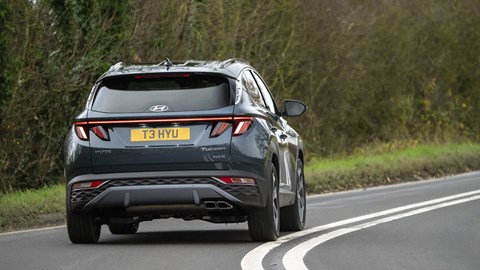
Are self-charging hybrids any good?
Plenty of people object to the term self-charging hybrid, and many others complain that these cars don’t take a big enough step towards the goal of full electrification. Compared with plug-in hybrids they have no big on-paper electric-only driving range figures to point to.
However, they can still deliver dramatically impressive fuel economy without the need to be plugged into an electric car charger, which makes them a very fuss-free way to reduce your running costs. Especially as they cost less than plug-in hybrid tech at the equivalent level.
We’ve more in-depth information about the difference between hybrid car types, if you need it.
Which manufacturers make self-charging cars?
Self-charging hybrids are offered by several brands. Toyota and Lexus are probably the best known proponents of self-charging models, but Hyundai, Kia, Honda, Mazda, Suzuki, Renault and Ford sell them, too.